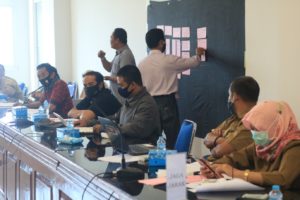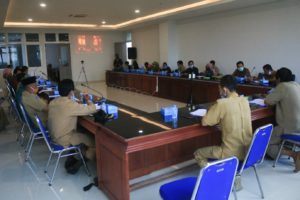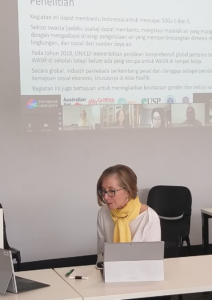
- Research project
- – Western Pacific
By Dr Ni Made Utami Dwipayanti, Dr Johanna Loehr, Dr Anindrya Nastiti, and Bronwyn Powell,
COVID-19 is impacting people’s lives around the world. It has forced many to take up working from home and is affecting how international research projects are conducted, especially for projects where co-design with stakeholders is required.
The International WaterCentre, Griffith University, is working on a DFAT supported Water for Women project in partnership with the University of Udayana, Institute of Technology Bandung and University of the South Pacific, researching water, sanitation and hygiene (WASH)-at-Work in hotels in Fiji and Indonesia. The project’s aim is to engage hotels in improving gender equity, disability and social inclusion (GEDSI) WASH-at Work practices, which consider WASH beyond the hotel, including staff, their families and the wider destination. While the project’s focus will help hotels and destinations address new challenges, the current COVID-19 pandemic has created and received wide stakeholder interest; the pandemic has also created new challenges as to how to conduct the project under the current circumstances.
An important part of most research projects is to engage with relevant stakeholders to more effectively understand the local context, gain input into project design, collect data, verify or test findings and inform implementation. COVID-19 induced travel restrictions and social distancing requirements impact the format such engagement can take and for a while constrained any form of in-person contact.
After some delays, the project recently completed formative research data collection and analysis to understand norms and attitudes to GEDSI WASH-at-Work in Mandalika, Lombok. Mandalika is a popular destination for international and domestic tourists as an alternative to Bali due to its natural beauty, beaches, diving and surfing. Between 2015 and 2019 tourist visits doubled to over 2 million per year and are expected to grow further once travel restrictions are lifted.
The project works in partnership with Mitra Samya, a local NGO, and their researchers were able to continue face-to-face data collection using online and social distancing measures. To complete the first formative research phase, a large face-to-face stakeholder engagement workshop had been planned to present and validate findings to government officials, NGOs, tourism operators and community representatives. Gaining stakeholder input in the development of inclusive WASH-at-Work tools was a critical step to inform the next phase, i.e. co-design of the project. Stakeholder input also helps to build and maintain relationships, which are important for the testing of tools and the overall implementation phase. During the height of COVID-19 restrictions, all engagement was limited to online or phone interviews. However, there are advantages to gathering all stakeholders together for a workshop, as it allows the exchange of viewpoints, experiences and information between stakeholders builds trust and confidence between different stakeholders, enables group discussion and the opportunity for the group to agree on priorities. The project team considered a stakeholder workshop critical to the project’s success and thanks to the logistics, planning skills and coordination of in-country team members and partners, a successful multi-modal workshop was held in Mandalika, Lombok, Indonesia in September 2020.

How to conduct a bi-lingual, multi-stakeholder workshop during a pandemic
For the Inclusive WASH-at-Work project, it was important for multiple stakeholder groups from different locations to participate. These included hotel managers and community representatives from Mandalika, as well as provincial planning, tourism and health government representatives based in Central Lombok and Mataram, tourism associations located in Central Lombok, NGOs and academics located in Mataram. The research team consists of members based in Brisbane, Australia, including the project director and chief investigator, the in-country lead based in Denpasar, Bali, a researcher in Bandung, West Java and research assistants based in Lombok. Travel restrictions made it impossible for all team members to attend an in-person workshop. Many people would now have experienced online meetings, seminars and workshops, which many have argued have made access to presentations, online conferences and webinars more inclusive, eliminating the cost and time of travel. The challenge facing the project was that many local stakeholders, in particular community representatives, did not have access to such platforms, as these require a phone or computer and a reliable internet connection, which throws doubt on the inclusivity of such platforms. To ensure representation and input from all stakeholder groups, the project team decided to conduct a multi-modal workshop that would be delivered both online and in-person. Due to the online component, the initial one-day workshop was split into two half-days, to ensure participants did not become weary.
The set up
Local stakeholders were invited to an in-person workshop at the local site, adhering to social distancing. The Central Lombok Planning Office set aside a large room in their government building in the capital of Central Lombok, which was set up with a projector, internet connection to connect with other online participants and a microphone that connected to the online platform. Seats were spread around a large U-shape table, adhering to social distancing requirements. Several microphones were provided on the tables
Project team members and other stakeholders joined the workshop from their offices or homes elsewhere in Indonesia and Australia via the online meeting platform Zoom.
Facilitation
The room as well as all online participants were connected via Zoom. The in-country lead facilitated the majority of the workshop online, in particular, the presentation of results delivered by project members, partly in English and then translated into Bahasa Indonesia for participants who did not speak English. Stakeholder discussions and activities are important elements of workshops. Local research assistants facilitated in-room discussion for participatory activities that required input from in-room participants only.
For group discussion, all participants were spilt into three groups. Each group consisted of in-room and online participants; there were three computers providing in-room connection to the Zoom platform with three different rooms. The three rooms allowed for online participants to be involved in breakout discussion sessions.
The discussion in each group was conducted in Bahasa Indonesia. Each group was led by a facilitator, either in-person or online, and was supported by one notetaker. For the presentation of group discussions, all groups returned to the main session. One of the local researchers took notes and translated key messages into English, which were posted on the Zoom chat to allow Australian colleagues to keep up with workshop discussion and respond to questions raised.

Lessons learned
Workshop outcomes and stakeholder feedback following the workshop were positive indicating that workshops can be conducted even with severe constraints, as long as participants show some flexibility. Using a multi-modal workshop made the workshop more inclusive and enabled the project team to connect a wide range of stakeholders even during times of travel restrictions.
To facilitate a workshop that runs both online and in-person, planning and preparation are essential. For our team this included setting up and testing sound, image and internet quality in each location, having a well-planned agenda including time buffers, and detailed briefing of all facilitators. Activities need to be planned to engage in-room participants and participants joining online. In person representation and facilitation of the workshop and activities in each room are also critical so that in-person workshop attendees don’t have to listen to presenters on screen all day.
Our experience shows that workshops don’t require everyone to be physically present and that they can be inclusive and successful even in difficult times. This learning is also applicable to provincial level officers and experts, who usually have a tight schedule, to join and monitor the workshop from a distance. Bringing people together allowed them to exchange their recent experiences and talk about a joint approach to moving forward and into the co-design of Inclusive WASH-at-Work guidelines. The team is becoming adept at running multi-modal workshops and will be planning more.
Acknowledgements
This research project is funded by the Australian Government and implemented by International WaterCentre as part of the Water for Women Fund. This blog post was written by Dr Ni Made Utami Dwipayanti, University of Udayana, Dr Anindrya Nastiti, Institut Teknologi Bandung, Dr Johanna Loehr, Bronwyn Powell and Prof. Helen Johnson, International WaterCentre, Griffith University. We would like to thank and acknowledge our colleagues in this project, Dr Dawn Gibson, Nanise Masau, Patricia Bibi, Dr Chris Fleming and Dr Wade Hadwen.
